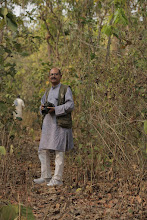Swimming against the tide runs in
her genes. So does love for mother earth. While women in southern states of
India are famously crazy about gold jewellery, Malini Kalyanam shuns gold and
wears pendant and bangles made from clay. She designs and makes exquisite
jewellery, flower bouquets, wall-hangings and a variety of other artefacts from
clay in her studio on the outskirts of Chennai.
“Besides being eco-friendly, clay
has immense medicinal value. I was cured of my obesity within months of taking
up pottery as my hobby,” says Malini whose efforts at weight reduction through
physical exercise and diet had failed to achieve the desired result. “Using
clay face-pack also got rid of my dark spots and dry skin on my face,” she
adds.
She is so passionate about clay
that she has given up using cosmetics as well. “I have clients now who ask for
clay face-packs that I prepare from different types of clay,” she says. Malini
sources clay from the neighbouring states of Andhra Pradesh and Karnata as also
from Tamil Nadu. She now wants to source vegetable and natural dyes from groups
that are engaged in dyeing fabrics and wood with eco-friendly natural colours
from Kerala and Kutch in Gujarat.
“Like most children, I too was
naturally drawn to clay and would soil my hands and clothes while coming back
from school and would get scolded by my father for dirtying myself,” she says
with a naughty spark in her eyes. “It is a different story that father would
often reminisce about Mahatma Gandhi using mud pack to control his high blood
pressure,” she adds with a chuckle.
Malini’s father, V Kalyanam, 91
was Mahatma Gandhi’s secretary during his last years after the latter’s release
from jail in 1944 till his death in 1948. In fact, it was his love for
gardening that had propelled Kalyanam to quit government job and go to
Gandhiji’s ashram in Sewagram. “But when Gandhiji came to know that I knew
typing, he stopped me from working in the farm and made me a typist again,”
says Kalyanam.

 However, at 91, Kalyanam today
sweeps the street with a broom every morning and grows vegetables on the
terrace garden of his house in Central Chennai. “In just four years of his
association with Gandhiji, father imbibed all his values and is now trying to
relive them,” says Malini.
However, at 91, Kalyanam today
sweeps the street with a broom every morning and grows vegetables on the
terrace garden of his house in Central Chennai. “In just four years of his
association with Gandhiji, father imbibed all his values and is now trying to
relive them,” says Malini.
But Malini is no Gandhian. After
her MBA from a US university, Malini joined an MNC in Bangalore as manager,
human resources. “One day, I saw a woman, in her early 40s, giving a
demonstration of her work of art on a potter’s wheel in a shopping mall in
Bangalore. I asked her if she would teach me pottery. She agreed and my love
and passion for pottery grew as I kept on learning from her,” she says.
“Initially, I worked on a small
potter’s wheel which I installed in my home. School children from the
neighbourhood would come to watch me give various shapes to the lump of clay.
Fascinated, they would ask me to try their hands on the wheel,” recalls Malini.
Her joy knew no bounds when she noticed that working with the clay – preparing
the clay, pounding and moulding it – the mere contact with the clay was having
a beneficial effect on her health and physique.
“I had this tendency towards
obesity and no amount of dieting and physical exercise was helping me reduce my
weight. But after I started working with clay, not only did I become lean and
thin but the texture and lustre of my skin too improved,” she says.

 Two years ago she decided to quit
her job and become a full-time potter. “I opened a studio in our bungalow on
the outskirts of Chennai. The studio is equipped with a motorized potter’s
wheel and an electric kiln. There, I conduct workshops of various durations ranging
from a day to a week,” says Malini.
Two years ago she decided to quit
her job and become a full-time potter. “I opened a studio in our bungalow on
the outskirts of Chennai. The studio is equipped with a motorized potter’s
wheel and an electric kiln. There, I conduct workshops of various durations ranging
from a day to a week,” says Malini.
Through her personal website – www.malinipottery.com – and through
various social networking sites, Malini has managed to attract buyers for her
pottery from Europe, the USA and Southeast Asian countries.
“I have held a
couple of exhibitions in Chennai, but I am not targeting domestic buyers. I
make very limited number of pottery and specialize in jewellery, wall-hangings,
flower vase and the like. These are much in demand abroad,” she says.
Malini, who also actively takes
part in various social work programmes, wants to teach pottery to poor women in
association with some not for profit organizations so that they can earn their
livelihood by making and selling pottery for the fashion conscious buyers.
NACHIKETA DESAI


